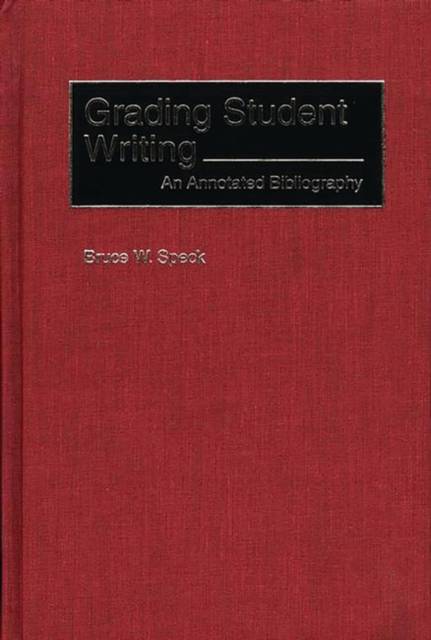
- Retrait gratuit dans votre magasin Club
- 7.000.000 titres dans notre catalogue
- Payer en toute sécurité
- Toujours un magasin près de chez vous
- Retrait gratuit dans votre magasin Club
- 7.000.0000 titres dans notre catalogue
- Payer en toute sécurité
- Toujours un magasin près de chez vous
Description
While the grading of student writing is of central concern to composition studies and to teaching, the process has not been clearly defined. The act of assigning a grade raises such issues as how teachers read student writing, whether form and content are of equal concern, what the purpose of grading is, and whether grading should take place at all. The vagueness of grading points to the complexity of the topic, which encompasses such matters as student peer review, psychometrics, student-teacher conferences, portfolios, collaborative learning, and English-as-a-Second-Language. Because of the centrality of grading and its complexity, the topic has generated a large body of literature. This reference book is a helpful guide to the vast and sometimes bewildering body of research on the grading of student writing.
The volume includes entries for more than 1300 books and articles on grading published between 1970 and 1996. Each entry includes an annotation that summarizes the work and its importance. The entries are grouped in several broad chapters, with most chapters containing numerous subsections. Thus the book covers such topics as holistic grading, portfolio assessment, collaborative approaches to assessment, essay tests, creative writing, whole language, standardized tests, and student progress. The entries are arranged alphabetically within each subsection, and the author and subject indexes allow the user to access information quickly.Spécifications
Parties prenantes
- Auteur(s) :
- Editeur:
Contenu
- Nombre de pages :
- 336
- Langue:
- Anglais
- Collection :
Caractéristiques
- EAN:
- 9780313299322
- Date de parution :
- 19-03-98
- Format:
- Livre relié
- Format numérique:
- Genaaid
- Dimensions :
- 164 mm x 242 mm
- Poids :
- 671 g

Les avis
Nous publions uniquement les avis qui respectent les conditions requises. Consultez nos conditions pour les avis.






